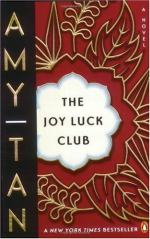|
|
The Joy Luck Club Topic Tracking: China/America
Chapter 1
China/America 1: Jing-mei thinks of her mother's life in China as mysterious, and so removed that she hardly even believes it was real. She always thought of it as just a Chinese fairy tale, so she was shocked when she found out that there was still some of her mother left in China: her two younger sisters. Her mother, however, is a master storyteller. She brings the past to life with her words, making Jing-mei see it, even though she doesn't understand half of it.
Chapter 6
China/America 2: Even though Lena looks white unless someone is looking for her Chinese features, Lena identifies more with her mother than with her father. She views her father, in fact, almost across the same rift as her mother does. They understand Chinese language and superstition, he doesn't. They understand what Lena thinks of as "Chinese fears," and he seems blind to them.
Chapter 8
China/America 3: June doesn't understand her mother's "Chinese" personality traits. She hates the way her mother brags about her to Lindo Jong. She cannot understand why she has to be obedient all the time. She does not want to bend to her mother's every whim. But this is exactly what Suyuan expects from June, and she gets very angry when June doesn't listen to her.
Chapter 9
China/America 4: Lena, who has always identified with her Chinese mother more than her American father, wonders if being Chinese has given her evil powers. She and her mother talk in ways that Harold cannot understand, just as they used to talk in front of Lena's father. Lena believes she has a terrible bond with her mother: they can see bad things before they happen, but they don't know how to stop them.
Chapter 10
China/America 5: No matter how much Waverly loves Rich, and how American she is, she needs him to understand her mother's Chinese attitude, even if she herself rejects it. Rich completely fails at this: he doesn't understand the complex way to compliment someone, or how to eat at dinner, or how to be polite and yet friendly. And even though Waverly dislikes these Chinese customs, she desperately wants Rich to understand them the way she does. Whether they like it or not, their cultural backgrounds are in conflict.
China/America 6: Just as they were divided between American and Chinese culture, Rich, Waverly and Lindo connect over it. The couple decides to have their honeymoon in China, and they are even considering all going together. Lindo needed to be reassured that the American Rich could fit into her life, and that Waverly understood her Chinese heritage. Once they understood this, their differences began to disappear.
Chapter 11
China/America 7: Rose always thought that American ways were better than Chinese ways. But now she realizes that sometimes Chinese opinions are less complicated and more understandable than American opinions. Rose was always afraid of her mother and Old Mr. Chou, the Chinese character who guarded the land of sleep. But once she realizes that she doesn't need Ted, her American husband who overly complicates things and doesn't care about her, she begins to feel closer to her Chinese heritage.
Chapter 13
China/America 8: An-mei wonders, like her daughter Rose, whether their Chinese culture might have created problems for them. Are they indecisive and weak because they were taught to accept their fates, however sad, without protest? An-mei feels that their histories are inescapable--her own mother, herself, and her daughter have all turned out this way. She wonders if, being women in Chinese culture, they had no choice.
China/America 9: An-mei draws a distinction between Western culture and Eastern culture. Americans, she implies, use psychiatrists who encourage them to talk about their suffering as a way of understanding themselves. Chinese people like her mother, however, suffered and cried because they had no choice. There was nothing to understand--they could not change their sad fates, so they cried. An-mei describes the Chinese peasants as banding together to kill their sorrows (the birds), rather than just talking about them and allowing them to continue.
Chapter 15
China/America 10: Lindo believes that only Waverly's physical features are Chinese: inside, she is "American-made." Lindo even thinks that Chinese and American culture don't mix. Yet Lindo can see how similar she and Waverly look, and she knows they have much of the same personality traits. It's obvious even to the hairstylist, no matter how much Waverly would like to deny it.




